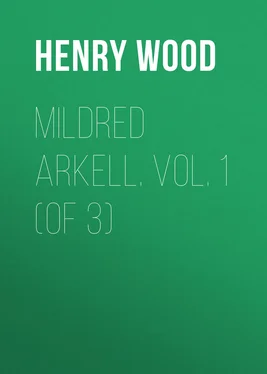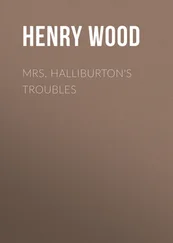Henry Wood - Mildred Arkell. Vol. 1 (of 3)
Здесь есть возможность читать онлайн «Henry Wood - Mildred Arkell. Vol. 1 (of 3)» — ознакомительный отрывок электронной книги совершенно бесплатно, а после прочтения отрывка купить полную версию. В некоторых случаях можно слушать аудио, скачать через торрент в формате fb2 и присутствует краткое содержание. Жанр: foreign_sf, literature_19, foreign_antique, foreign_prose, на английском языке. Описание произведения, (предисловие) а так же отзывы посетителей доступны на портале библиотеки ЛибКат.
- Название:Mildred Arkell. Vol. 1 (of 3)
- Автор:
- Жанр:
- Год:неизвестен
- ISBN:нет данных
- Рейтинг книги:4 / 5. Голосов: 1
-
Избранное:Добавить в избранное
- Отзывы:
-
Ваша оценка:
- 80
- 1
- 2
- 3
- 4
- 5
Mildred Arkell. Vol. 1 (of 3): краткое содержание, описание и аннотация
Предлагаем к чтению аннотацию, описание, краткое содержание или предисловие (зависит от того, что написал сам автор книги «Mildred Arkell. Vol. 1 (of 3)»). Если вы не нашли необходимую информацию о книге — напишите в комментариях, мы постараемся отыскать её.
Mildred Arkell. Vol. 1 (of 3) — читать онлайн ознакомительный отрывок
Ниже представлен текст книги, разбитый по страницам. Система сохранения места последней прочитанной страницы, позволяет с удобством читать онлайн бесплатно книгу «Mildred Arkell. Vol. 1 (of 3)», без необходимости каждый раз заново искать на чём Вы остановились. Поставьте закладку, и сможете в любой момент перейти на страницу, на которой закончили чтение.
Интервал:
Закладка:
"I thought Arthur Dewsbury was to go into the army," remarked Mrs. Dan, not yet reconciled to the thing. "Soldiers don't want to be so very proficient in the classics."
"Not Arthur; he is intended for the church: the second son will be brought up for the army. Mildred, what do you say—should you take it if you were me?"
"I should," replied Mildred; "it appears to me to be a wonderfully easy way of earning money. But it is for your own decision entirely, Peter: do not let my opinion sway you."
"I think I had decided before I hung up my top-coat and hat on the peg at the bank," answered Peter. "Yes, I shall take it; I can but resign it later, you know, mother, if I find it doesn't work well."
The cathedral clock, so close to them, was chiming the quarters, and the first stroke of five boomed out; Peter rose and stretched himself with a relieved air. "It's always a weight off my mind when I get any knotty point decided," quoth he, rather simply; and in truth Peter was not good for much, apart from his Latin and Greek.
At the same moment, when that melodious college clock was striking, William Arkell was driving in at his own gates. He might have made more haste had he so chosen; and Mr. Arkell had charged him to be home "before dark;" but William had not hurried himself.
He was driving in quickly now, and stopped before the house-door. Philip left his seat and went to the horse's head, and William assisted out Miss Travice.
"Have you enjoyed your drive, Charlotte?" he whispered, retaining her hand in his, longer than he need have done; and there was a tenderness in his tone that might have told a tale, had anyone been there to read it.
"Oh! very, very much," she answered, in the soft, sweet, earnest voice she had grown to use when alone with William. "Stolen pleasures are always sweetest."
"Stolen pleasures?"
" This was a stolen one. You know I usurped the place of your cousin Mildred. She ought to have come."
"No such thing, Charlotte. She can go anytime."
"I felt quite sorry for her. I am apt to think those poor seamstresses require so much air. They–"
"Those what?" cried out William—and Miss Charlotte Travice immediately knew by the tone, that she had ventured on untenable ground. "Are you speaking of my cousin Mildred?"
"She is so kind and good; hemming cambric frills, and stitching wristbands! I wish I could do it. I was always the most wretched little dunce at plain sewing, and could never be taught it. My sister on the contrary–"
"I want to speak a word to you, Arkell."
William turned hastily, wondering who was at his elbow. At that moment the hall-door was thrown open, and the rays of the lamp shone forth, revealing the features of Robert Carr. Charlotte ran indoors, vouchsafing no greeting. She had taken a dislike to Robert Carr. He was free of speech, and the last time he and the young lady met, he had said something in her ear for which she would be certain to hate him for his life—"How was the angling going on? Had Bill Arkell bit yet?"
"Hallo!" exclaimed William as he recognised him. "I thought you were in London! I heard you went up on Tuesday night!"
"And came down last night. I want you to do me a favour, Arkell."
He put his arm within William's as he spoke, and began pacing the yard. William thought his manner unusual. There seemed a nervous restlessness about it—if he could have fancied such a thing of Robert Carr. William waited for him to speak.
"I have had an awful row with the governor to-day," he began at length. "I don't intend to stand it much longer."
"What about?"
"Oh! the old story—my extravagance. He was angry at my running up to town for a day, and called it waste of money and waste of time. So unreasonable of him, you know. Had I stayed a month, he'd not have made half the row."
"It does seem like waste, to go so far for only a day," said William, "unless you have business. That is a different thing."
"Well, I had business. I wanted to see a fellow there. You never heard any one make such a row about nothing. I have the greatest mind in the world to shake off the yoke altogether, and start for myself in life."
William could not help laughing. " You start?"
"You think I couldn't? If I do, rely upon it I succeed. I'm nearly sick of knocking about. I declare I'd rather sweep a crossing, and get ten shillings a week and keep myself upon it, than I'd continue to have my life bothered out by him. I shall tell him so one of these first fine days if he doesn't let me alone. Why doesn't he!"
"I suppose the fact is you continue to provoke him," remarked William.
"What about?" was the fierce rejoinder.
"Oh! you know, Carr. What I spoke to you of, before—though it is not any business of mine. Why don't you drop it?"
"Because I don't choose," returned Robert Carr, understanding the allusion. "I declare, before Heaven, that there's no wrong in it, and I don't choose to submit myself, abjectly, to the will of others. The thing might have been dropped at first but for the opposition that was raised. So long as fools continue that, I shall go there."
"For the girl's own sake, you should drop it. I presume you can't intend to marry her–"
"Marry her!" scoffingly interrupted Robert Carr.
"Just so. But she is a respectable girl, and–"
"I'd knock any man down that dared to say she wasn't," said Robert, quietly.
"But don't you know that the very fact of your continuing to go there must tend to damage her in public opinion? Edward Hughes must be foolish to allow it."
"Where's the wrong, or harm, of my going there?" demanded Robert, condescending to argue the question. "I like the girl excessively; I like talking to her. She has been as well reared as I have."
"Nonsense," returned William. "You can't separate her from her family; from what she is. I say you ought to drop it."
"What on earth has made you so squeamish all on a sudden? The society of that fine London lady, Miss Charlotte Travice?"
They were passing in a ray of light at the moment, thrown across the yard from one of the carriage lamps. Philip had left the carriage and the lamps outside, and was in the stable with the horse. Robert Carr saw his companion's face light up at the allusion, but William replied, without any symptom of anger—
"I will tell you what, people are beginning to talk of it from one end of the town to the other. I don't think you have any right to bring the scandal upon her. You bring it needlessly , as you yourself admit. A girl's good name, once lost, is not easy to regain, although it may be lost unjustly."
"I told you months ago, that there was nothing in it."
"I believe you; I believe you still. But now that the town has taken the matter up, and is passing its opinion upon it, I say that for the young girl's sake you should put a stop to it, and let the acquaintance cease."
"The town may be smothered for all I care—and serve it right!" was Robert Carr's reply. "But look here, Arkell, I didn't come to raise up this discussion, I have no time for it; and you may just take one fact into your note-book—that all you can say, though you talked till doomsday, would not alter my line of conduct by a hair's breadth. I came to ask you a favour."
"What is it?"
"Will you lend me the carriage for an hour or so to-morrow morning? It's to go to Purford."
"To Purford! Why that's where I have just been. I dare say you may have it. I will ask my father."
"But that is just what I don't want you to ask. I have to go there on a little private business of my own, and I don't wish it known that I have gone."
William hesitated. Only son, and indulged son though he was, he had never gone the length of lending out his father's carriage without permission; and he very much disliked the idea of doing so now. Robert Carr did not give him much time for consideration.
Читать дальшеИнтервал:
Закладка:
Похожие книги на «Mildred Arkell. Vol. 1 (of 3)»
Представляем Вашему вниманию похожие книги на «Mildred Arkell. Vol. 1 (of 3)» списком для выбора. Мы отобрали схожую по названию и смыслу литературу в надежде предоставить читателям больше вариантов отыскать новые, интересные, ещё непрочитанные произведения.
Обсуждение, отзывы о книге «Mildred Arkell. Vol. 1 (of 3)» и просто собственные мнения читателей. Оставьте ваши комментарии, напишите, что Вы думаете о произведении, его смысле или главных героях. Укажите что конкретно понравилось, а что нет, и почему Вы так считаете.












